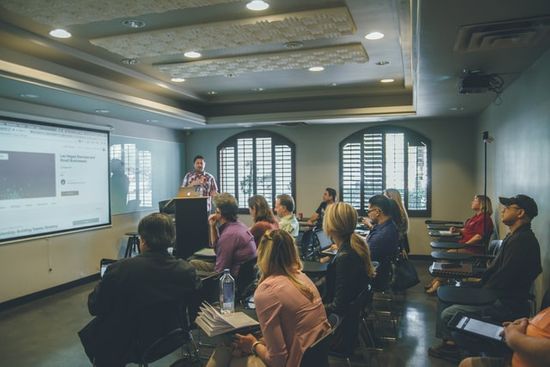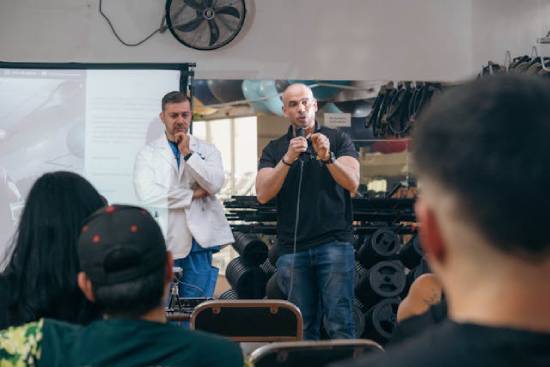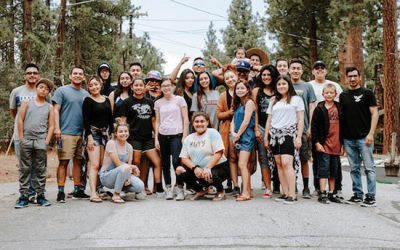The Seventh-day Adventist Church puts a huge emphasis on sharing the gospel through evangelism, or sharing the gospel through preaching, teaching, and testimony. One of the ways we accomplish this is by organizing public events called evangelistic meetings.
You might have heard of one—maybe through a friend or family member—or seen one advertised. Or you may even have been invited to one.
So let’s go over the details of what these meetings are all about:
- What is an Adventist evangelistic meeting, and why are they so important?
- What are the different types of evangelistic meetings?
- Who can attend them?
- How do you find one to attend?
Let’s begin with a deeper understanding of what exactly an evangelistic meeting is.
What is an Adventist evangelistic meeting?
An Adventist evangelistic meeting is a meeting held by Adventists for the purposes of sharing the gospel and introducing people to the wealth of fascinating information in the Bible.
While the word “evangelism” refers to any act of sharing about Jesus and the teachings of the Bible, there are many different forms. These large public meetings are just one.
So the main purpose of Adventist evangelistic meetings is to point people to Jesus, show God’s love for humanity, and explore the truths of the Bible.
Generally, most denominations within Christianity hold such meetings, so it’s not unique to Adventists.
This practice can be traced back to Jesus Himself when He preached to crowds both large and small. Sometimes this would happen in people’s homes, at the seaside, or in open plains to a large gathering.1
The apostles and the early Christian church also followed Jesus’ example.2
In more recent history, these meetings have been referred to as:
- “Gospel meetings,” because their purpose was to preach the gospel
- “Revival meetings,” because they often called for, or led to, religious revivals
- “Protracted meetings,” because they could be a series of meetings spread over several days or weeks3
Then in the 19th century, they began to be called:
- “Tent meetings,” since they were held outdoors under large tents
- “Camp meetings,” because attendees would pitch tents around the main tent
Seventh-day Adventism was born around this time and adopted the camp meeting evangelistic model because it was so effective and enjoyable.4
These were 7-10-day meetings held annually in different locations.
Normally, one or several out-of-town preachers were invited as the main speakers. And there were morning, daytime, and evening sessions.
Messages were Christ-centered, emphasizing the transforming power of the gospel and inviting all to a closer walk with Jesus.
There was also deeper Bible study of prophecy, and other practical issues like health, and family life.
Then with time, they began holding them in church buildings and other public spaces.
Adventist evangelistic meetings today

Photo by Wan San Yip on Unsplash
Today, these meetings continue in Adventism. And being in the 21st century, you can bet they’re quite different in terms of setting, style, and programming.
They are often referred to as prophecy or health seminars, since those are common topics that garner a lot of interest.
And rather than taking several full days, like tent meetings of the past, they may be short evening meetings over a span of a few days, or on specific days of the week.
Also, apart from being held in church buildings, they can be located in:
- Community centers
- Hotels and conference facilities
- Convention centers
- Stadiums
- School and college campuses
- Open-air parks, amphitheaters, or other large public areas
And beyond being just in person, many of them are also held virtually, aired online, or through various media outlets.
But even with the changes, the purpose and message of the meetings remain the same—to teach the love of Jesus Christ.
A meeting usually includes some moments of prayer to ask for God’s guidance and blessing on the event, and for the Spirit of God to lead both the preacher and attendees to a deeper commitment to God and the Bible.
There may also be singing, testimonies from attendees, panel discussions, or question and answer sessions.
There is also a focus on discipleship, where attendees who showed interest in learning more about Jesus and the Bible can receive further resources, mentorship, or fellowship with a small group.
But most Christian denominations hold evangelistic meetings in a similar manner. So what is it that makes Adventist evangelistic meetings different?
What’s unique about Adventist evangelistic meetings?
As we’ve mentioned before, Adventist evangelistic meetings are similar to other Christian meetings for evangelism.
The one thing that makes them “Adventist” is how Adventist beliefs are part of the teachings. Beliefs like the spirit of prophecy, the Sabbath, and whole-person health are uniquely Adventist teachings that are also extremely relevant to our lives today. So Adventists are eager to share these potentially life-changing things with others who are searching.
That’s why we have meetings like health seminars and cooking schools, which may not be common parts of other denominations’ meetings.
Also, Adventists emphasize the importance of everyone reading the Bible for themselves, and confirming the words of Scripture. In an Adventist meeting, you’ll notice everything preached is backed by Scripture. And the preacher encourages everyone to bring their Bibles and follow along, rather than just listening to the presenter.
We’ll look at the different types of meetings in Adventist evangelism next.
What are different types of evangelistic meetings?

Photo by Kenny Eliason on Unsplash
Adventist evangelistic meetings are usually tailored to meet varying needs of those attending. There are meetings like:
They can be large or small events, formal or more relaxed…it all depends on the type and the type of community they’re held in.
They are often organized by the local church in a given place. Mostly, members are trained to participate in different areas. Other times, guest speakers, professionals like doctors, chefs, dieticians, or biblical scholars are invited to tackle specific topics.
Let’s look at the different types.
Prophecy seminars
Prophecy seminars are a series of meetings that look at Bible prophecy, especially from the books of Daniel and Revelation.
They can also be called “prophecy conferences” or “prophecy summits.”
The preacher systematically covers:
- How Bible prophecy has been fulfilled in the past
- How some prophecies are being fulfilled today, or in an ongoing manner
- Prophecies that are yet to be fulfilled
It can be fascinating and even fun, with all kinds of interesting evidence to show how God has fulfilled Bible promises and predictions. This can include a deep dive into historical timelines, looking at great historical personalities and ancient kingdoms, or reviewing archeological discoveries.
There’s also a pointed focus on Last-day or End-time events that the Bible predicts will come upon the earth sooner than we probably think, as we look forward to Jesus’ soon return.
With this, you’ll learn how to live for Christ in today’s world, and how to prepare for the end times.
Examples of such meetings are:
- Pastor Mark Finley’s Revelation’s Ancient Discoveries, and The Book of Daniel series
- Pastor Taj Pacleb’s Revelation of Hope Bible Prophecy Seminar
In some cases, the meeting is referred to as an evangelistic campaign or evangelistic series when it’s a large-scale event.
It could be a single session based on a given theme, but organized to reach a larger audience. Maybe by having it conducted in multiple locations simultaneously, or aired through multiple media channels with a heightened sense of urgency.
Good examples are the Total Member Involvement evangelistic meetings and the Unlocking Bible Prophecies campaign.
In some parts of the world, the meeting could include many different types of sessions together.
For example, the event may be every evening of a given week. And it may comprise:
- A short Bible study session
- An hour or so prophecy seminar
- Various health education programs breakout session
- Family life small groups session
Or there can be a large-scale health clinic a day(s) before the evangelistic meeting, or concurrently with the meetings.
Each of these sessions will normally be tied together by a single theme for the whole event.
Family life programs
These are programs for the family, often tailored for certain age groups, or based on family roles. They include:
- Parenting workshops
- Programs for married couples
- Programs for youth, children, men, or women
Health Seminars

Photo by Instituto Alpha Fitness
Because of Adventists’ great regard for healthy living, they include health education as part of their evangelistic efforts.
They’re mostly interactive, with some even including demonstrations, as we’ll see.
And apart from addressing health of body and mind, they often start off with a short devotional—usually prayer and some Bible reading. This takes care of spiritual health.
Let’s look at the different programs that promote a healthy lifestyle.
Lifestyle education programs
These go through the different principles for healthy living.
In these programs, you’ll learn the health benefits of these gifts of nature, and practical ways to implement them in your daily life.
The program can run for weeks, with meetings on one day, and the rest of the week to practice.
It can also run as part of a NEWSTART health expo, like this virtual program by an individual congregation, the Camp Hill Seventh-day Adventist Church. Or as a community health clinic like Your Best Pathway to Health.
Mental health programs
These focus on mental health, looking at how spirituality and preventive lifestyle methods can help us.
You’ll get a deep understanding of mental issues in today’s world. As well as learn the latest in scientific research and lifestyle practices that help in mental health cases.
An example is the eight-week depression and anxiety recovery programs offered by churches like Alvarado Seventh-day Adventist Church.
Cooking classes
Since a healthy diet is an important part of healthy living, Adventist churches often have cooking schools. They provide healthy recipes and cooking demonstrations.
Here, you’ll learn all the kitchen secrets of making simple, healthy, and affordable, but also sumptuous meals.
An example is Joy of Living Cooking School by Woodside Seventh-day Adventist Church.
Addiction recovery programs
These are programs to walk with those struggling with various addictions in their journey to recovery.
The programs are often called “Journey Groups”. They’re based on a 12-step workshop called Journey to Wholeness, put together by the Adventist Recovery Ministries.
These provide a safe environment for participants to share experiences and reach for freedom through the help of the Holy Spirit.
Who can attend Adventist evangelistic meetings?
Adventist evangelistic meetings are open for everyone.
Whoever you are, you are welcome—with or without a personal invitation. You can always walk in and there will be someone to receive you and fill you in on the details of the event.
Whether you’re an Adventist church member, active or inactive. Or any other Christian denomination. Or even if you are non-Christian.
How to find Adventist evangelistic meetings
The easiest way to find out about an upcoming meeting is at your local Adventist church. You can learn from announcements during Sabbath worship service, or the church bulletin, the church pastor, or even church members.
You can also find up-to-date information on the Adventist church website, or other social platforms.
Or you can search online for meetings at other churches apart from the one nearest to you. Another place to look is various Adventist evangelism groups like Amazing Facts.
You can locate the evangelistic meeting and attend live, or virtually on their websites, on Youtube, or Facebook.
Also, many past events are now available online on-demand as full videos or as a playlist. Examples include:
- It Is Written
- Three Angels Broadcasting Network (3ABN)
- Amazing Facts
- Hope Channel International
- Amazing Discoveries
- Secrets Unsealed
Adventist evangelistic meetings are all about sharing Jesus
As you’ve seen, these meetings are centered on sharing hope, truth, and the love of Jesus. Be it through prophecy seminars, or the healing ministry of the health seminars.
They all lead us to experience the transforming power of the Holy Spirit in our lives.
They are great opportunities to draw closer to Jesus and gain a new perspective. A new perspective on life, our relationships with ourselves, with others, and with God.
To learn more about what Adventists believe and teach, check out the Adventist beliefs page.
Related Articles
More Answers
How Do Adventists Make Movie and Music Choices?
How do Adventists decide what music to listen to and which movies to watch? Learn how Bible principles can help us make better entertainment choices.
Does the Seventh-day Adventist Church Believe in Paying Tithe?
Seventh-day Adventists believe in paying tithe and offerings based on the biblical command and our commitment to being wise stewards of God’s resources. These donations help fund the mission of the Adventist Church by supporting pastors, missionaries, church expenses, and evangelistic projects, among other things.
Seventh-day Adventist World Population and Demographics
The Adventist Church has more than 22 million members and 100,000 churches worldwide, plus a large system of hospitals, schools, and publishing houses. Learn more about this diverse church.
What Is a Seventh-day Adventist Camp Meeting?
Although camp meetings didn’t begin with the Seventh-day Adventist Church, they’re as much an Adventist thing as haystacks.
Camp meeting is an extended event for Adventists (and non-Adventists) of all ages to gather and participate in spiritual seminars and activities. During the event, attendees often camp in tents, campers, or RVs.
How to Join the Seventh-day Adventist Church
Whether you heard about the Seventh-day Adventist Church through a traveling evangelist, during your online searches, or through a loved one or relative, you might be considering joining yourself.
How Do Adventists Do Baby Dedications?
For Christians, dedication ceremonies for babies, also for older children, are an important time for parents and the church. It’s a special part of the worship service when parents present their young children to God and the church family. Both parents, along with the congregation, regard this as a solemn promise to be a Christ-like example to the child.
Do Adventists Celebrate Communion and Foot Washing?
Like many Christian denominations, Adventists regularly participate in communion, also referred to as the “Lord’s Supper” or the “Last Supper.” They also practice foot washing (John 13:1-20), or the “ordinance of humility,” during the service—which isn’t as common.
What is the Concept of “Present Truth” and Why is it Important?
Present truth is the principle that certain biblical truths are relevant to God’s people at specific times in history. God sends the Holy Spirit to reveal truths that help us better understand how to interpret and apply His Word in a present moment.
Do Seventh-day Adventists Celebrate Easter
Yes, many Seventh-day Adventists do celebrate Easter.
Does the Adventist Church Have Youth Ministry Programs?
The Seventh-day Adventist Church has been organizing and operating youth ministry programs since 1879.
In our opinion, youth ministry is one of the most important ministries a church can have.
Do Adventists Celebrate Birthdays?
Yes, most Seventh-day Adventists do celebrate birthdays because we see them as excellent reminders of the life God has blessed us with. And we celebrate them the same way everyone else does—with friends, family, presents, and a special meal.
What Do Adventists Offer for Young Adults?
In recent years, the age group often classified as “young adults” has been trickier to engage. It’s been a significant concern for Christian churches around the world. Though interestingly enough, similar observations regarding young adults have been coming up in conversations about the economy, the entertainment industry, politics, and more.
Do I Need to be an Adventist to be Saved?
The answer to this question is simply, “no.”
When it comes to salvation in Jesus Christ, all that is required of a person is to acknowledge Jesus’ sacrifice for us, believe that He has saved us, and claim the free gift of salvation that is always available to us. Salvation is not based on denomination.
Do You Have to Be Vegetarian to Be Adventist?
Of course not. Membership in the Seventh-day Adventist Church has never included any dietary requirements. However, there might be some reasons people might think that. So many Adventists are vegetarians or even vegan, and a plant-based lifestyle has many health benefits.
All About Seventh-day Adventist Colporteurs
The Seventh-day Adventist Church uses a variety of methods to spread the hope of the gospel to the world. One of these ways is through colporteuring, also called “canvassing” or “literature evangelism.”
What Is an Adventist Book Center (ABC)?
When you walk into any one of the many Adventist Book Center (ABC) locations, chances are you’ll be greeted by pleasant gospel music in the background, friendly employees, and row after row of Christian books, movies, Bibles, study guides, kids’ games, and more.
Do Seventh-day Adventists Celebrate Holidays?
Wondering whether your Adventist classmate or coworker keeps the same holidays you do? Perhaps you want to include them in some festivities, but you also want to respect their beliefs. Thus, you’re unsure of how to navigate the holiday question. Will they accept your invitation to the office Christmas party?
The Adventist Haystack (It’s Not What You Think) + 4 Recipes
Haystacks are basically a taco salad—with an Adventist spin on it! Most versions are vegetarian and offer an endless combination of tasty toppings. We eat them often because they’re healthy, scrumptious, and easy to make.
Do Seventh-day Adventists Believe in Medical Care?
The Seventh-day Adventist Church believes in and supports evidence-based medical care. In fact, medicine has played a significant part in our history, and today we run a major health system with hospitals, medical schools, and clinics throughout the world.
All about Adventist Elementary Schools
The Seventh-day Adventist Church operates the largest Protestant education system in the world. A big part of this system is our K-8 elementary schools, or primary schools, as they’re known in other parts of the world.
What Are Pathfinder and Adventurer Clubs?
Like the boy or girl scouts, Pathfinders and Adventurers learn about nature and life skills. But what makes these clubs special is their purpose to bring young people closer to Jesus.
A Look at Adventist Colleges and Universities
On the outside, Seventh-day Adventist universities may not look much different than other college campuses. But the real differences are beneath the surface.
What Is ASI (Adventist-Laymen’s Services and Industries)?
ASI, which stands for Adventist-laymen’s Services and Industries, is a membership-based organization that provides support for Seventh-day Adventist laypeople (Adventist professionals who aren’t pastors).
Christian Summer Camps—A Cherished Adventist Ministry
School’s out, the sun’s shining, and your kids are thrilled to have the summer ahead of them. Then three days in, you hear, “I’m bored…”
Do Adventists Have Their Own Bible?
Adventists have some unique beliefs—you might be able to name some of them right now. The seventh-day Sabbath. Death as a sleep. Hell as nonexistence.
What Is Vespers?
Friday rolls around, and you’re spending time with your Adventist friends or relatives when they mention they’re going to vespers tonight.
Adventist Pastors
What is the role of a pastor in the Adventist Church? The position itself, at least as far as a local congregation is concerned, is not much different from that of pastors in other protestant denominations.
The Leadership Structure of the Seventh-day Adventist Church
The Seventh-day Adventist Church has a representative form of structure that connects its 90,000-plus congregations across the globe and gives its members a part in decision-making. Though the Church was incorporated in 1863, this system came about during the church’s reorganization from 1901 to 1903. It includes four levels of organization.
What to Expect When You Go to an Adventist Church
If you’re attending an Adventist church for the first time, you may wonder what it’s really like. While each Adventist church is unique in its collective personality and local culture, Adventist church services are generally similar to most other Protestant church services.
































